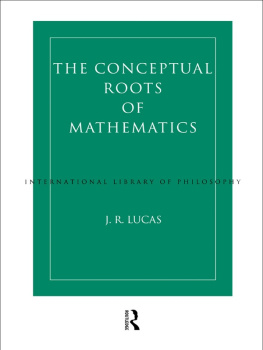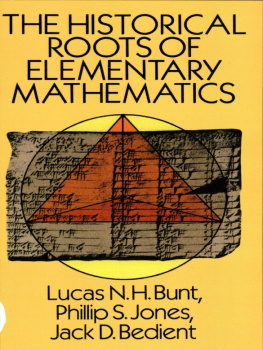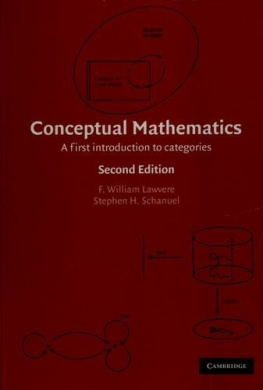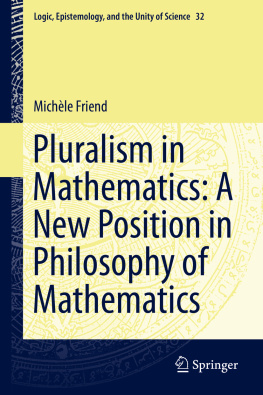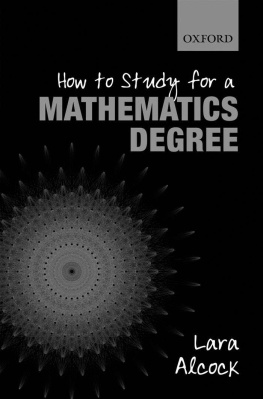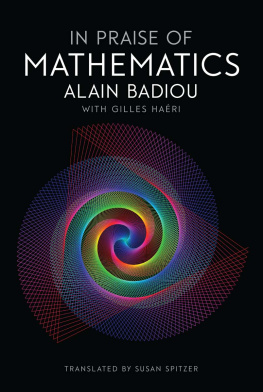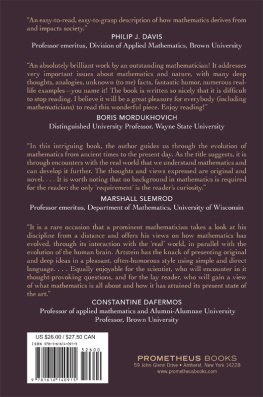J.R.Lucas argues for a chastened Logicism. He claims that though mathematical arguments are a priori, they are not all always deductive. Our mathematical concepts are grounded in logic, although often developed to something essentially new.
Mathematical argument is viewed in a new way, as a two-person dialogue rather than a formal proof-sequence. Peanos Fifth Postulate and the Axiom of Choice can be justified if we construe them not as would-be truths, but as principles of argument between two rational seekers after truth. Geometers will be relieved to learn that geometry is neither a branch of physics nor a purely formal exercise, and will be intrigued by a consumers guide to geometry that recommends Euclids as the Best Buy.
INTERNATIONAL LIBRARY OF PHILOSOPHY
Edited by Tim Crane and Jonathan Wolff
University College London
The history of the International Library of Philosophy can be traced back to the 1920s, when C.K.Ogden launched the series with G.E. Moores Philosophical Papers and soon after published Ludwig Wittgensteins Tractatus Logico-Philosophicus. Since its auspicious start, it has published the finest work in philosophy under the successive editorships of A.J.Ayer, Bernard Williams and Ted Honderich. Now jointly edited by Tim Crane and Jonathan Wolff, the ILP will continue to publish works at the forefront of philosophical research.
Other titles in the ILP include:
PERSONAL IDENTITY AND SELF-CONSCIOUSNESS
Brian Garrett
THE SCEPTICAL CHALLENGE
Ruth Weintraub
DISPOSITIONS: A DEBATE
D.M.Armstrong, C.B.Martin, and U.T.PlaceEdited by Tim Crane
PSYCHOLOGY FROM AN EMPIRICAL STANDPOINT
Franz Brentano
Edited by Oskar Kraus, English Edition edited by Linda L.McAlisterWith a new introduction by Peter Simons
Translated by Antos C.Rancurello, D.B.Terrell, Linda L.McAlister
G.E.MOORE: SELECTED WRITINGS
G.E.Moore
Edited by Thomas Baldwin
THE FACTS OF CAUSATION
D.H.Mellor
REAL TIME II
D.H.Mellor
THE CONCEPTUAL ROOTS OF MATHEMATICS
An essay on the philosophy of mathematics
J.R.Lucas
First published 2000
by Routledge
11 New Fetter Lane, London EC4P 4EE
Simultaneously published in the USA and Canada
by Routledge
29 West 35th Street, New York, NY 10001
Routledge is an imprint of the Taylor & Francis Group
This edition published in the Taylor & Francis e-Library, 2002.
2000 J.R.Lucas
All rights reserved. No part of this book may be reprinted or reproduced or utilized in any form or by any electronic, mechanical, or other means, now known or hereafter invented, including photocopying and recording, or in any information storage or retrieval system, without permission in writing from the publishers.
British Library Cataloguing in Publication Data
A catalogue record for this book is available from the British Library
Library of Congress Cataloging in Publication Data
Lucas, J.R. (John Randolph), 1929
The conceptual roots of mathematics/J.R.Lucas.
p. cm.
Includes bibliographical references and index.
1. MathematicsPhilosophy. I. Title.
QA8.4.L833 1999 9920193
510'.1dc21 CIP
ISBN 0-203-02842-2 Master e-book ISBN
ISBN 0-203-20274-0 (Adobe eReader Format)
ISBN 0-415-20738-X (Print Edition)
Introduction
The Roots? For many years I lectured in Oxford on the Conceptual Foundations of Mathematics; but, as I did so, I became increasingly uncomfortable with Descartes metaphor of an edifice for which foundations were the appropriate basis. Pedagogically it was bad: it meant spending a lot of time on recondite logic-chopping, the point of which could not be understood until much later in the course, when we were on to proper mathematical topics. Metaphysically it was dubious, too. If I had been as clever as Archimedes, I might have been able to move minds, given a firm starting point, but no firm starting point was, or, as I came to believe, could, be given. To start from the absolutely incontestable was to start from nowhere. Here was where we were, and there was where we might be, but any journey of exploration or justification had to start from some point or other, and any actual starting point could be put in question by a skilful sceptic.
I worked through these difficulties in my British Academy Lecture, Philosophy and Philosophy Of, and there suggested that another of Descartes metaphors was more appropriate: we should think of mathematics not as a building based on foundations, but as a tree grounded in the soil of our general conceptual structure, and growing both up and down. This metaphor, too, is inadequate, but less so than the building one, and so I adopt it in the title for this work.
I start and end with Plato. He was right to distinguish mathematical arguments from empirical ones, but failed in his various attempts to characterize them positively. He was his own severest critic, and outlined, as alternatives to Platonism, approaches we can recognise as proto-formalist and proto-logicist.
The paradigm mathematical discipline was geometry, and in I argue that its axioms cannot be taken as being simply self-evident, and cannot be merely postulated either. Geometry is not just a formal discipline, but is subject to conceptual constraints arising from its place in our conceptual structure, and the accompanying operational needs. Various geometries are possible, but a Which? guide to geometry recommends Euclids as the Best Buy.
Formalism is considered more fully in . It has its uses, not only for checking arguments, and revealing fallacies, but for revealing similarities between different branches of mathematics, and as a topic of study in itself. Nevertheless, Formalism offers an inadequate account of mathematical knowledge. It secures validity at the price of vacuity, and does not at all conform to the actual practice of mathematicians.
A logicist approach to the natural numbers is developed in . The Intuitionists, like Aristotle, reject actual infinites, allowing only the potential infinite. But their selective scepticism is unstable, being vulnerable to more extreme scepticism on the part of finitists and ultra finitists; and any arguments they can adduce against these can in turn be used by classical logicians against Intuitionist scruples.
Infinite sets can be mapped into proper subsets of themselves, and hence a formal system that includes the natural numbers can be so coded that statements about it can be represented within it. Gdel was thus able to construct a well-formed formula somewhat analogous to the Liar Paradox, and in Gdels theorem is explained, and its implications, which greatly alter our understanding of logic and logical argument, discussed.

